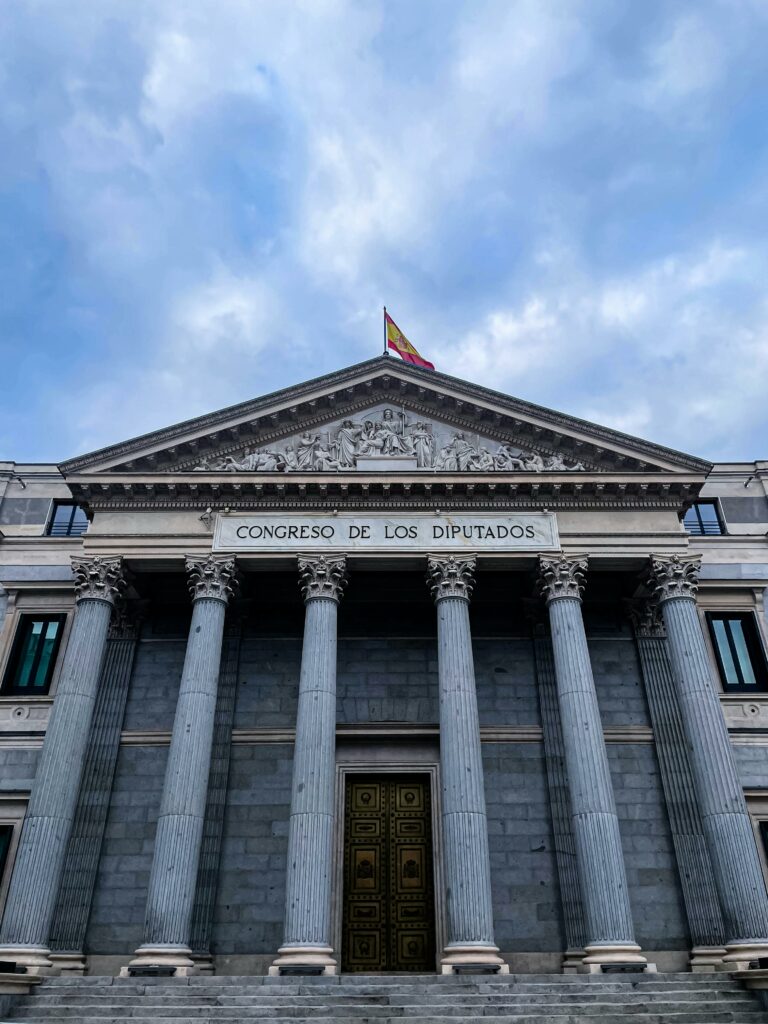
By: Enrique Opi Tufet, Regional Manager of InFluCat and Senior Adviser on Tourism.
.
As the saying goes, “calm seas never made good sailors”, and Spain’s current turbulent political climate is testing the resilience, skill, and adaptability of its leaders like never before. The complex balance of power, regional demands, and fragile alliances may be unsettling, but it also offers a rare opportunity to navigate toward deeper reforms and a more pluralistic governance—provided those at the helm are ready to face the storm with clarity and courage.
Spain’s Prime Minister Pedro Sánchez faces mounting pressure from within his own governing coalition, both in Madrid and Catalonia. As he navigates the demands of key partners—Sumar, Junts per Catalunya, and Esquerra Republicana de Catalunya—his ability to maintain political stability is continually tested. While additional pressures exist, notably from parties in the Basque Country, this article focuses specifically on the challenges and negotiations Sánchez encounters with his coalition allies in Madrid and Catalonia.
Sumar: the progressive left’s social and institutional demands
Sumar, led by Yolanda Díaz, is the coalition’s progressive force, emphasizing social justice and institutional reform:
Anti-Corruption Initiatives. Sumar calls for robust anti-corruption measures, including asset expropriation from corrupt actors, lengthy bans on public contracts for convicted companies, and the creation of an independent anti-corruption agency with investigative powers.
Expanding Social Policy. The party pushes for more ambitious social reforms, especially in housing and care, and opposes increases in military spending, advocating instead for greater investment in social programs.
Narrative of Progress. Sumar seeks to counteract political disaffection by promoting a clear, progressive vision for Spain’s future.
Key Anti-Corruption Measures by Sumar.
- Establishment of an Independent Anti‑Corruption Agency. Sumar is submitting a proposal to create a standalone agency with investigative and sanctioning powers, capable of collaborating with the Prosecutor’s Office and accepting anonymous reports.
- Creation of an Anti‑Fraud/Corruption Office in Congress. They’re pushing a proposition of law in the Congress to institutionalize an Ombudsman‑style office for fraud prevention, following recommendations from GRECO (Group of States against Corruption).
- Tougher Legal Framework & Penalties. Their demands include:
- Banning companies convicted of corruption from public contracts for up to 20 years.
- Criminalizing illicit enrichment of public officials.
- Extending bans on convicted individuals holding public office for up to 30 years.
- Prohibiting pardons in corruption cases.
- Asset Seizure & Corporate Liability. Sumar wants to introduce mechanisms to expropriate assets or benefits obtained through corruption and hold companies accountable for their role in corrupt practices.
Urgent Legislative Backing. These measures are part of a broader package—24 anti-corruption initiatives and 8 social laws—intended to be enacted before August, to avoid Congressional recess and stabilize the coalition.
Junts: catalan nationalists pressing for autonomy and pact fulfilment
Junts, representing Catalan nationalist interests, leverages its parliamentary influence to secure regional objectives:
Enforcement of Investiture Agreements. Junts refers to the formal “Acuerdo político entre el PSOE y Junts per Catalunya” (signed 9 Nov 2023), which commits Sánchez to an international mediated amnesty and other guarantees in return for Junts’s support Junts demands strict adherence to the agreements including the controversial Amnesty Law for Catalan leaders involved in the 2017 independence movement.
Amnesty Law. Junts emphasizes the immediate execution of the 2024 Amnesty Law (Organic Law 1/2024), which pardons those prosecuted over the 2017 referendum They view delays or hindrances—especially from the Supreme Court—as breaches of the investiture accord.
Fiscal Autonomy. The party seeks full control over Catalonia’s tax revenues, citing a lack of trust in the central government’s commitments.
Consensus Governance. Junts insists on prior consensus for major government actions, warning against unilateral decisions and threatening motions of confidence if agreements are not honoured.
Political Accountability. The party maintains a critical stance, ready to withdraw support if their demands are not met.
Security. Junts has also recently explicitly demanded the full transfer of security powers, including:
- Control over El Prat Airport (Barcelona) and other key infrastructures.
- Border management, particularly in relation to customs and migration.
- Expanded powers for the Mossos d’Esquadra (Catalan police), including in areas currently under the remit of the Guardia Civil or Policía Nacional.
ERC also supports these demands, though it tends to frame them within broader goals of administrative decentralization and improving public service efficiency rather than as sovereignty issues. These demands are not new; they date back to earlier Statute of Autonomy negotiations, and gained renewed attention during the investiture talks in late 2023.
However, the emphasis on fiscal sovereignty and the Amnesty Law has overshadowed security, but airport control, migration policy, and full Mossos authority remain on the table as medium-term objectives, particularly in Junts’s roadmap.
There have been already partial concessions, such as:
- Enhanced Mossos responsibilities in public order and cybersecurity.
- Dialogue about dual management models for infrastructure (e.g. AENA and Catalan Government partnerships).
ERC: pragmatic independence with a focus on negotiation
Structured Dialogue. ERC calls for a formal negotiation table between the Spanish and Catalan governments, with no preconditions, a defined calendar, and clear guarantees Structured Dialogue Table. ERC advocates for a formal, no precondition “mesa de negociación” with set agendas, schedules, and bilateral guarantees.
Amnesty and Referendum. The party insists on an amnesty for those involved in the 2017 events and the right to a self-determination referendum Amnesty & Referendum. Like Junts, ERC pushes for both amnesty and a binding self-determination referendum as pillars of the investiture deal.
Fiscal regime and Rail. ERC demands improvements in Catalonia’s financing. A unique fiscal regime with its own Agency and the transfer of competencies such as control over regional rail services (Rodalies).
Recognition and Respect. The party seeks acknowledgment of Catalan political realities and respect for its leaders, some of whom remain imprisoned or in exile. They seek from the Spanish Government Political Recognition Strong emphasis on respecting and protecting Catalan leaders still detained or in exile
Official Status of Catalan in the EU. ERC strongly advocates for Catalan to be recognized as an official EU language. This was part of the investiture negotiations, and although progress has been slow, ERC continues to push the Spanish government to actively lobby Brussels for formal recognition, seeing it as a matter of cultural dignity and European equality.
Language Rights and Education. ERC continues to push for full protection of Catalan in schools and media, opposing any attempt by the central government or courts to impose quotas for Spanish in Catalonia’s education system. They frame this as defending linguistic immersion and cultural sovereignty.
In conclusion, ERC balances its pro-independence stance with pragmatic engagement:
PSC’s role: the Socialist in Catalonia
The PSC, led by Salvador Illa, plays a crucial role as a mediator between the Spanish government and the Catalan independence bloc. Supporting the amnesty and certain fiscal reforms, the party insists these be pursued within the framework of constitutional legality, with the goal of ensuring stable governance and economic balance.
PSC has become a central actor not only in the national investiture process—aligned with the PSOE—but also in shaping the future Catalan government. It co-signed the pre-agreement with ERC to support Illa’s election as President of the Generalitat, which includes commitments to a “concierto económico” and enhanced fiscal sovereignty for Catalonia.
Positioning itself as a moderate and reliable force, the PSC works to reconcile the demands of nationalist parties with the priorities of the central government. It offers measured flexibility on sensitive issues like amnesty while maintaining its commitment to legal and institutional stability. In doing so, it seeks to counter political polarization and facilitate a broader consensus across ideological divides.
InFluenze Spain: international network consultant’s perspective
From the vantage point of an international consultancy network, Spain’s coalition dynamics mirror challenges found in other multi-party democracies worldwide:
Coalition Management. Effective governance requires balancing diverse ideological and regional interests, with each party’s support contingent on visible progress toward their core demands.
Policy Trade-offs. The government must navigate between advancing progressive social reforms and addressing regional autonomy, often requiring complex trade-offs.
Political Stability. The risk of coalition fragmentation is high, with the potential for motions of no confidence or early elections if demands are unmet.
Strategic Communication. Sustaining the coalition depends on transparent negotiation, trust-building, and the ability to craft a unifying narrative that addresses both national and regional aspirations.
Beyond the headline demands for amnesty, a self-determination referendum, fiscal sovereignty, and control over Rodalies, ERC is also pressing Pedro Sánchez on a range of structural and symbolic issues. These include securing official EU language status for Catalan, increasing state investment in Catalonia, reforming the judiciary, ending what they describe as “lawfare” against pro-independence leaders, and reinforcing Catalan language rights in education and public life. Crucially, many of these demands imply a redefinition of the core competencies of the Spanish state—particularly in matters of fiscal policy, justice, and national sovereignty—and would ultimately require constitutional reform. ERC is fully aware of this and presents these requests as part of a gradual but determined roadmap toward a new political framework for Catalonia within—or potentially outside—the Spanish constitutional order.
Spain’s current political moment underscores the complexities of coalition governance in a fragmented parliamentary system, where negotiation, compromise, and strategic foresight are essential for stability and progress.
.
For more information, join our social media profiles on X and LinkedIn.

